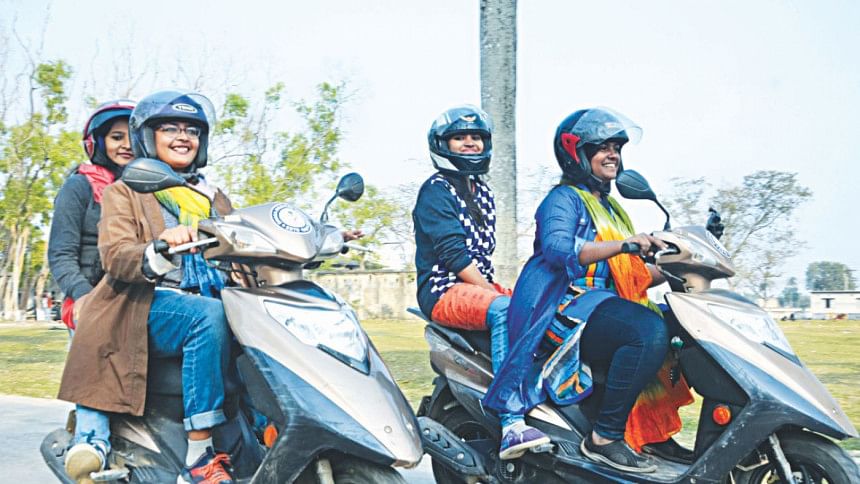The Motorcycle Diaries

Their first obstacles were their families and their apprehension. When a group of four women—Sakia Hoque, Manoshi Saha, Silvy Rahman and Shamsun Nahar—decided to explore Bangladesh's North on motorbikes, they were told horror stories of kidnap, rape and accidents. When the horror stories failed to waver their interest, the families asked them to get married first.
But their desire to travel on their own won in the end.
"Getting married and having children is not the only job of a woman. Through our travels, we wanted to show that women can chose to go on their own adventures," says Sakia Hoque, one of the travellers.
Sakia and Manoshi lead the team, driving the scooters. Both of them hail from Khulna and began travelling together when they were third year students of Dhaka Medical College. Internee doctors at the college now, they have been financing their adventures with the money they earn through private tuition.
Silvy is finishing her Masters in Philosophy from University of Dhaka, while Shamsun Nahar is starting her Masters in Persian Language and Culture in the same university. They, too, finance their own travels.
"Even when we want to travel with our own money, it becomes difficult to convince our families—they want to know who we are travelling with and they prefer female companions. But where will we find them in a country where so few women travel alone?" says Silvy.
The desire to find female travel companions—and to support and inspire women to travel—led them to open a social media group, Travelettes of Bangladesh, in November 2016. They received an enormous response in two years, with a following of 27,000 members, including students, working women, and housewives. While organising frequent trips for other women, the four travellers felt the urge to travel all corners of Bangladesh on their own.
In early 2017, when Karnaphuli Automobile Limited donated Sakia and Manoshi two scooters for their travels, the group decided to embark on the long-awaited journey.
"Once we were planning the trip though, we began to wonder: what would we achieve through these travels? Sure, we would have an adventure and immerse ourselves in the culture and heritage of our country, but what did we have to offer to our countrymen through it, to the communities we would be visiting? Then we thought why not consider addressing the issues that we ourselves faced while growing up as women," says Shamsun.
The four women wanted to connect with young girls they would meet on the way and engage them in open discussions on their rights and sexual and reproductive health—issues that are still considered taboo in Bangladeshi society. In April 2017, they began the journey across the country under the title of 'Empowering the women through travelling'.
The women traversed highways, small towns, muddy rural roads and even sandy river-chars of the 16 northern districts one after another for a month. In six phases, they travelled East, South and central parts of Bangladesh. The seventh phase to the north, which began on January 12 of this year, was completed on January 30 when they reached their 50th district in Sirajganj.
In addition to visiting the heritage sites of each area, the travellers also met high school girls in every district, holding sessions with them on health issues, and raising awareness on matters of nutrition, self-defence and other problems faced during adolescence. "We didn't want to limit any of the women's experiences. We wanted them to explore their ideas without fear and ask us whatever questions they had," explains Sakia.
"Girls in towns are more or less informed about their health and reproductive rights, but the situation in the villages is still very different," she adds. Many of the girls would blush, some lowered their heads and others hid their faces behind books when the four of them would start to discuss menstruation in the classroom. "Most girls still think that menstruation is an 'unholy' thing. Many don't even know what it is," she says.
The travellers would initiate the discussions by showing them videos which normalised menstruation as a natural part of womanhood. Gradually, the students would ease into the topic.
"Eventually though they would find the courage to speak up not just on menstruation but also child marriage, sexual harassment and other issues young girls faced in the area. It was then that we felt like our mission was complete," says Sakia. "We don't think we can empower women just by travelling. But ours is just one step forward. Girls saw us riding scooters, living outside our homes and addressing different issues. Seeing this, perhaps many others will find the drive to follow their own dreams."
Like them, they saw many local girls peddling bicycles and riding motorcycles without any disturbance in extreme northern districts of Panchagarh, Thakurgaon and Dinajpur. But the sight of the four of them travelling in scooters was enough to draw lewd comments in many districts. Worse still, men would begin swinging their motorcycles to show off every chance they got. On one occasion on their way to Chapainawabganj from Naogaon, a man swung his motorcycle around and hit Sakia's scooter, damaging the plastic front. None of them were hurt, but the incident left a lasting mark in their memories.
"We still have a long way to go when it comes to teaching the world how to behave with women," says Sakia.
Anwar Ali is staff correspondent, Rajshahi at The Daily Star. He can be reached at [email protected]

 For all latest news, follow The Daily Star's Google News channel.
For all latest news, follow The Daily Star's Google News channel. 



Comments